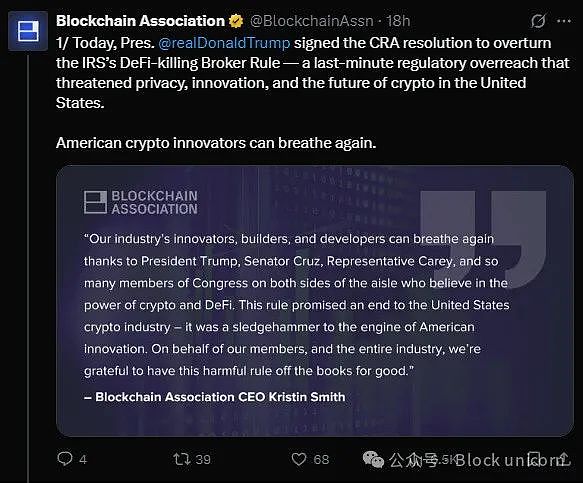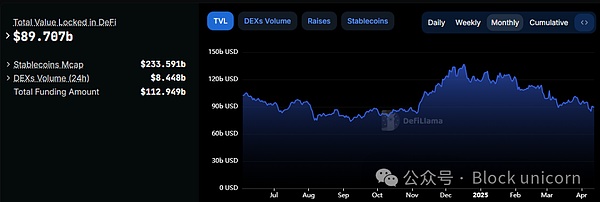Author:Token Dispatch, Prathik Desai,Compiler:Block unicorn
U.S. President Donald Trump scored his first cryptocurrency victory on Thursday when he signed a resolution repealing the Internal Revenue Service’s (IRS) controversial decentralized finance (DeFi) broker rules. This is also the first crypto-related bill signed by a president in U.S. history. After years of regulatory uncertainty, the crypto industry finally has solid evidence that Washington is listening.
The resolution passed with impressive bipartisan support, 70 to 28 in the Senate and 292 to 132 in the House, suggesting that cryptocurrency may have finally transcended political divisions.
This reversal does more than just remove a problematic tax rule; it could be a prelude to determining how the decentralized finance ecosystem evolves in the world’s largest economy.
In this article, we’ll walk you through the origins of the DeFi broker rule, the significance of its repeal, and, more critically, how it will set the stage for an entirely new approach to crypto regulation under a Trump 2.0 administration.
Biden’s parting gift
On December 27, 2024, in the final weeks of the Biden administration, a controversial IRS rule was finalized requiring “DeFi brokers” to collect and report user transaction information—the last crackdown on crypto innovation before the change of government.
The rule expanded the definition of “broker” in the 2021 Infrastructure Act to include DeFi platforms, requiring them to issue 1099 forms to users and report transaction details to the IRS. The rule was originally scheduled to take effect on January 1, 2027.
This shocked industry experts and prompted them to fight back.
Why? Seven words: It’s technically impossible to comply.
The Biden administration specifically targeted “front-end service providers.” Think of MetaMask or Uniswap websites, which millions of users use to exchange tokens—intuitive interfaces that make decentralized protocols accessible to ordinary users.
Under the rule, these front ends would be required to collect names, addresses, phone numbers, and transaction details—information they wouldn’t have access to in a truly decentralized ecosystem.
When faced with criticism for this contradiction, the IRS responded with a perfunctory statement:
"Persons with technical expertise who engage in a trade or business related to financial services are subject to the same rules as other persons engaged in the business of financial services."
This exposes one thing - a profound misunderstanding of how decentralized systems work. Industry leaders have described this as an
"irreconcilable contradiction"
require entities to collect information they simply cannot access.
This means that platforms will either have to rebuild their protocols to collect information that violates core principles of user privacy and decentralization, or exit the U.S. market entirely.
The Biden Treasury Department's last-minute extension of the rule to DeFi is seen as an executive overreach without the approval of Congress.
David Sacks, Trump's AI and crypto chief, unceremoniously called it a "midnight regulation," saying it "will stifle American innovation, raise privacy concerns, and impose unprecedented compliance burdens on American DeFi companies."

Turning point
The importance of repealing the rule itself goes far beyond a minor tinkering with tax policy.
Under the Congressional Review Act, which Congress used to repeal the rule, the IRS cannot issue “substantially similar” regulations without new congressional authorization. This does more than just suspend the rule, but creates a breathing space for developers and entrepreneurs who can now proceed with development with greater confidence.
The passage of the resolution shows that the crypto industry has finally achieved what it has been pursuing for years: gaining significant political capital in Washington.
Want more good news? This may just be the beginning. Treasury Secretary Scott Bessent said at the recent White House Digital Asset Summit that he plans to “revoke and modify” the relevant crypto tax rules.
Bipartisan and Industry Support
The most important feature of this reversal is the bipartisan nature of its victory.
When Republicans joined dozens of Democrats in voting to overturn the Democratic administration's rules, it revealed a shift in the political importance of cryptocurrency and that financial technology innovation deserves room to grow.
This marks a major shift from the SEC era under Gary Gensler, when Democratic leadership largely supported aggressive enforcement actions against crypto companies.
Even Senate Minority Leader Chuck Schumer broke with his party’s leadership to support the measure, a political calculus that speaks volumes about the growing importance of cryptocurrency in elections.
Industry groups that once struggled to gain traction have become influential voices.
The Blockchain Association and the DeFi Education Fund led an aggressive lobbying effort that successfully swung the Democratic vote to a veto-overriding majority. Their success shows how cryptocurrency advocacy has quickly matured, with outreach efforts to key lawmakers focused on specific policy issues rather than general blockchain education.
When the Biden administration introduced the rule, the Blockchain Association promised to take "aggressive action." They did deliver on their promise.
Four months after filing the lawsuit, the association is now celebrating the repeal of the rule that threatened to end the U.S. crypto industry.

Importantly, the victory came despite opposition from some influential Democrats who argued that the resolution could facilitate tax evasion.
Rep. Richard Neal, D-Mass., has warned that the move could cost the government $4 billion in tax revenue. That revenue is estimated to come from unreported capital gains, which will remain a point of contention as crypto advocates push for further deregulation.
Global Positioning
The signing of this resolution dramatically changes the United States' position in the race for global crypto dominance.
The contrast is stark. Just a few months ago, crypto companies were abandoning the U.S. market due to regulatory uncertainty.
Coinbase had prepared contingency plans to move overseas.
Now, the Trump 2.0 administration's campaign promise to position the United States asthe "crypto capital of the world"seems to be taking effect.
As global investment in DeFi surges—about $90 billion is now locked in the protocol, according to DefiLlama—countries that create a friendly regulatory environment stand to reap huge economic benefits: high-skilled jobs, tax revenue from legal operations, and technological leadership.

The resolution also sends a strong signal to regions and countries such as Hong Kong, the UAE, and Japan that are positioning themselves as crypto-friendly alternatives.
For global crypto entrepreneurs and investors, Thursday’s signing sends a clear message: America is open for business .
A Balancing Path
The resolution raises legitimate questions about the balance between innovation and tax compliance.
Critics, such as Rep. Lloyd Doggett, D-Texas, argue that repealing the rule would create exploitable loopholes for wealthy investors.
Such concerns are not entirely unfounded.
The decentralized nature of DeFi protocols means that transactions take place without the record keeping of traditional intermediaries. While the blockchain itself is transparent, it remains challenging to link wallet addresses to taxpayers. Without some sort of reporting mechanism, tax compliance relies heavily on voluntary disclosures.
Some policy experts have proposed a compromise - creating an optional compliance framework that trades some disclosure for regulatory clarity. This "safe harbor" approach would allow DeFi protocols to operate legally while gradually introducing appropriate safeguards.
Our View
Trump's signing of this resolution is a breakthrough in resolving the core contradiction of crypto regulation, which has plagued the industry since day one:
the collision of
industrial-age regulatory frameworks and digital-native financial systems.
This victory shows that Washington has finally acknowledged that forcing decentralized systems to adapt to centralized regulatory frameworks will not work. Innovation requires appropriate guardrails, not retrofitted barriers.
This moment reveals something deeper about America’s regulatory philosophy. For decades, U.S. financial regulation has followed a pattern: Innovation occurs, problems emerge, and regulation responds. The DeFi broker rule attempts to pre-emptively regulate before understanding the natural evolution of technology. Its failure suggests that the United States is returning to its traditional strengths—allowing innovation to flourish while addressing specific problems as they arise.
Celebrations should remain pragmatic. The crypto industry faces a critical credibility test. Having been granted regulatory breathing space, it must now deliver tangible benefits that go beyond traders’ profits. Can DeFi significantly improve access to finance? Will it reduce the costs of everyday transactions? Can it create more efficient markets that benefit the broader economy?
The bipartisan nature of this victory is both an opportunity and a warning. While crypto transcends partisan lines today, its support remains contingent on demonstrating real-world utility. If the industry fails to move beyond speculation and solve real problems, today’s allies may become tomorrow’s critics.
This reversal is a wake-up call for global competitors who believe the United States has abdicated its leadership in digital asset innovation. The United States has unparalleled capital markets , technical talent , and regulatory flexibility —factors that, when working together, create a powerful competitive advantage.
The road ahead remains challenging. SEC regulation of tokens, CFTC jurisdiction over derivatives, banks’ concerns about stablecoins — these questions remain unresolved. But the resolution shows that well-organized advocacy focused on specific technical issues can succeed where broad ideological arguments often fail.
The window for innovation has opened. Now industry needs to work with regulators to create a framework that both protects consumers and drives real innovation. Thursday’s signing suggests that, perhaps for the first time, both sides are ready to have that conversation.
 Hui Xin
Hui Xin
 Hui Xin
Hui Xin Davin
Davin Hui Xin
Hui Xin Catherine
Catherine Jasper
Jasper Kikyo
Kikyo Jasper
Jasper Clement
Clement Alex
Alex Jasper
Jasper